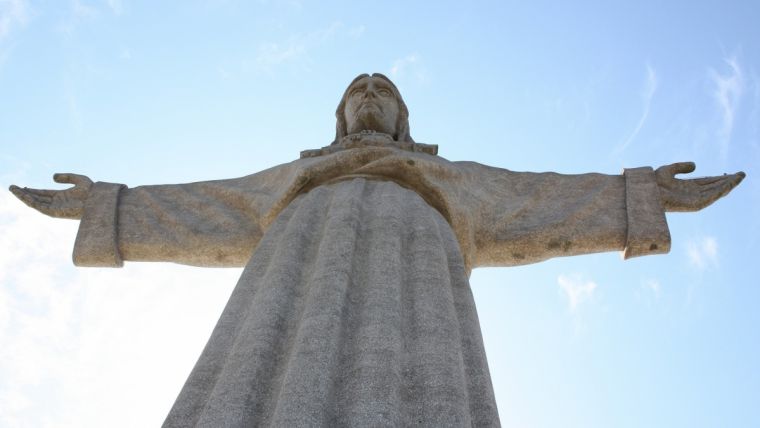x
To view this video please enable JavaScript, and consider upgrading to a web browser that supports HTML5 video

This week sees the Feast of Christ the King, when churches across the world will spend the Sunday before Advent reflecting especially on the kingship of Jesus. But where did this occasion come from and what does it mean?
Unlike many other feasts which are marked not just by Roman Catholics but by some Anglicans, Lutherans and Russian Orthodox believers, it's not an ancient celebration. In fact, it goes back less than a hundred years, to 1925.
The feast was instituted by the Pope at the time, Pius XI. He was wrestling with increasing modernisation of society and a consequent increase in secularism. The Pope responded by saying in an encyclical: "While nations insult the beloved name of our Redeemer by suppressing all mention of it in their conferences and parliaments, we must all the more loudly proclaim his kingly dignity and power, all the more universally affirm his rights."
History, of course, records that neither the Pope nor the feast itself managed to hold back the advance of secularism, at least in the Western world. But in a century when dictators of many kinds began to be looked on with quasi-divine reverence, the specific celebration of Jesus as the ultimate king had caught the imagination of many.
Dr Peter Kwasniewski explains how the feast developed from its original late October date (around the same time as Reformation Sunday) to the week before Advent, to focus on the place of Jesus in the future. "This new position emphasises rather the eschatological dimension of Christ's kingship," he says. "This Kingdom will be perfected and fully manifested only at the end of time, with the Second Coming. Hence in the new calendar the feast comes at the very end of the Church's year, as the summation of the whole of salvation history and the symbol of what we hope for."
Advertisement
So, on the Feast of Christ the King, hymns are sung which proclaim not only Jesus' rule and reign, but also those which point towards our future hope as Christians. This hope is especially important in times when society is in danger of breaking down in some way. In the 1920s, when nationalism and communism were endangering the lives of millions across Europe and beyond, the Pope understood this.
Though the situation isn't the same today, the spectre of authoritarian rule haunts parts of the world, still. The economic and social fabric of the West seems more flimsy than at any point since the 1970s, maybe even since the Second World War.
Sponsored
Watch Your Favorite Christian Films, 24/7.
Click Here To Start Your Free Trial Today
The Pope graphically described the conditions of the world in the 1920s: "the seeds of discord sown far and wide; those bitter enmities and rivalries between nations, which still hinder so much the cause of peace; that insatiable greed which is so often hidden under a pretence of public spirit and patriotism, and gives rise to so many private quarrels; a blind and immoderate selfishness, making men seek nothing but their own comfort and advantage, and measure everything by these; no peace in the home, because men have forgotten or neglect their duty; the unity and stability of the family undermined; society in a word, shaken to its foundations and on the way to ruin." His solution? Look to Jesus. "We firmly hope, however, that the feast of the Kingship of Christ, which in future will be yearly observed, may hasten the return of society to our loving Saviour."
Not everyone is a fan of the feast. Some Anglicans bemoan the fact the it has eclipsed 'stir up Sunday', the day when Christmas puddings would be stirred, and the collect for the day reads, "Stir up, O Lord, the wills of thy faithful people."
Evangelical theologian NT Wright has three concerns about the feast and its positioning at the end of the liturgical year (which begins again the Sunday after with Advent). Wright says: "First, the proper feast of Christ the King is Ascension… Second, the idea, that 'the kingdom of God' denotes either a purely future reality, or the reality which the saints presently enjoy in heaven is likewise way off the mark… Third, Advent itself celebrated Christ's second coming and the consummation of all things, not as a the end of a process but as a fresh act of grace."
Despite these reservations, millions will celebrate the feast of Christ the King around the world this Sunday. Its focus on the importance we place on the Kingship of Christ is a reminder for all of us to check our priorities before we enter the Advent season.
In a recent address the Archbishop of Canterbury recalled a conversation with a government minister who was bemoaning 'extremists' who put their religious faith above the rule of law. The Archbishop responded, "Well, you've got a real problem here because for me personally my faith is more important than the rule of law so you've got an extremist sitting in here with you… We do not believe as Christians that the rule of law outweighs everything else, we believe that the kingdom of God outweighs everything else."
Wherever it appears in the calendar, that appears to be the spirit of the celebration of Christ the King.


